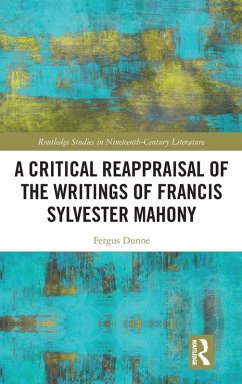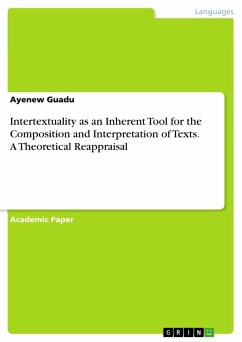Fergus Dunne
A Critical Reappraisal of the Writings of Francis Sylvester Mahony
Fergus Dunne
A Critical Reappraisal of the Writings of Francis Sylvester Mahony
- Gebundenes Buch
- Merkliste
- Auf die Merkliste
- Bewerten Bewerten
- Teilen
- Produkt teilen
- Produkterinnerung
- Produkterinnerung
This book resituates Francis Sylvester Mahony in an early nineteenth-century literary-historical context, counteracting the efforts of twentieth-century literary historians to obscure his contribution to the emergence of a distinctive Irish Catholic fiction in English.
Andere Kunden interessierten sich auch für
![Francis Bacon's Contribution to Shakespeare Francis Bacon's Contribution to Shakespeare]() Barry R. ClarkeFrancis Bacon's Contribution to Shakespeare168,99 €
Barry R. ClarkeFrancis Bacon's Contribution to Shakespeare168,99 €![Intertextuality as an Inherent Tool for the Composition and Interpretation of Texts. A Theoretical Reappraisal Intertextuality as an Inherent Tool for the Composition and Interpretation of Texts. A Theoretical Reappraisal]() Ayenew GuaduIntertextuality as an Inherent Tool for the Composition and Interpretation of Texts. A Theoretical Reappraisal17,95 €
Ayenew GuaduIntertextuality as an Inherent Tool for the Composition and Interpretation of Texts. A Theoretical Reappraisal17,95 €![The Critical Review or Annals of Literature, 1756-1763 Vol 13 The Critical Review or Annals of Literature, 1756-1763 Vol 13]() James G BaskerThe Critical Review or Annals of Literature, 1756-1763 Vol 13198,99 €
James G BaskerThe Critical Review or Annals of Literature, 1756-1763 Vol 13198,99 €![The Critical History of Edgar Allan Poe's The Narrative of Arthur Gordon Pym The Critical History of Edgar Allan Poe's The Narrative of Arthur Gordon Pym]() Ronald C. HarveyThe Critical History of Edgar Allan Poe's The Narrative of Arthur Gordon Pym167,99 €
Ronald C. HarveyThe Critical History of Edgar Allan Poe's The Narrative of Arthur Gordon Pym167,99 €![An Old-Spelling Critical Edition of James Shirley's The Example An Old-Spelling Critical Edition of James Shirley's The Example]() An Old-Spelling Critical Edition of James Shirley's The Example140,99 €
An Old-Spelling Critical Edition of James Shirley's The Example140,99 €![Modernist Aesthetics and Consumer Culture in the Writings of Oscar Wilde Modernist Aesthetics and Consumer Culture in the Writings of Oscar Wilde]() Paul FortunatoModernist Aesthetics and Consumer Culture in the Writings of Oscar Wilde176,99 €
Paul FortunatoModernist Aesthetics and Consumer Culture in the Writings of Oscar Wilde176,99 €![The Critical Review or Annals of Literature, 1756-1763 Vol 8 The Critical Review or Annals of Literature, 1756-1763 Vol 8]() James G BaskerThe Critical Review or Annals of Literature, 1756-1763 Vol 8151,99 €
James G BaskerThe Critical Review or Annals of Literature, 1756-1763 Vol 8151,99 €-
-
-
This book resituates Francis Sylvester Mahony in an early nineteenth-century literary-historical context, counteracting the efforts of twentieth-century literary historians to obscure his contribution to the emergence of a distinctive Irish Catholic fiction in English.
Produktdetails
- Produktdetails
- Verlag: Routledge
- Seitenzahl: 300
- Erscheinungstermin: 8. August 2018
- Englisch
- Abmessung: 235mm x 157mm x 21mm
- Gewicht: 588g
- ISBN-13: 9780367001124
- ISBN-10: 0367001128
- Artikelnr.: 54400639
- Herstellerkennzeichnung
- Libri GmbH
- Europaallee 1
- 36244 Bad Hersfeld
- gpsr@libri.de
- Verlag: Routledge
- Seitenzahl: 300
- Erscheinungstermin: 8. August 2018
- Englisch
- Abmessung: 235mm x 157mm x 21mm
- Gewicht: 588g
- ISBN-13: 9780367001124
- ISBN-10: 0367001128
- Artikelnr.: 54400639
- Herstellerkennzeichnung
- Libri GmbH
- Europaallee 1
- 36244 Bad Hersfeld
- gpsr@libri.de
Fergus Dunne received his Ph.D. in Anglo-Irish literature at the University of Sussex. His dissertation presented a critical reappraisal of the texts and contexts of Francis Sylvester Mahony. He has published several articles on various aspects of Mahony's literary and journalistic careers in international peer-reviewed journals.
Table of Contents
Introduction
Biographical Overview
Section 1.
1. Centrally Peripheral, Peripherally Central: The "Prout Papers" of
Francis Sylvester Mahony
William Maginn, Cork, and Fraser's Magazine
The "Prout Papers"
Mahony and O'Connell
Classicism and Cultural Continuity
Peripheral Considerations?
Conclusion
2. "Oppression Makes a Wise Man Mad": Representations of Jonathan Swift in
the Writings of Francis Sylvester Mahony
Economic Patriot?
Fictional Considerations: Sincerity and Irony
Conclusion
3. "Attaining Majority" in the Celtic Peripheries: Francis Sylvester
Mahony, Walter Scott, and "The Groves of Blarney"
"A Plea for Pilgrimages"
Antiquarianism and Narrative History
"The Groves of Blarney"
Conclusion
4. The Politics of Translation in "The Rogueries of Thomas Moore"
Moore as Nationalist Commentator
(Mis)representing the Irish Past
The Politicization of Historical Discourse
Equivalence and Politicized Translation
Conclusion
5. "Custom Doth Make Dotards of Us All": Peripheral Perspectives on the
Center in the "Prout Papers" and Sartor Resartus
Mahony, Carlyle, and Sartor Resartus
Intercultural Dialogue: Scottish and Irish Correlations
Translating the Center and Periphery
Cultural Translation
Conclusion
Section 2.
6. "From Cork [...] to St. Peter's Cupola": The Idea of Italy in the
Writings of Francis Sylvester Mahony
Mahony and The Daily News
Allegorizing Italian History
"The Fag End of an Old Reign"
"Unfurling the Banner of Reform"
Mahony, Young Ireland, and Roman Republicanism
Conclusion
7. "The Independent Expression of Public Opinion": The Paris Correspondence
of Francis Sylvester Mahony
The Globe Correspondence in Context
Parisian Letters
Ultramontanism in France
Mahony and Archbishop Cullen
Progressive Liberalism and Fenian Republicanism
Conclusion
Section 3.
8. Fragments, Politics, and "The Bells of Shandon"
Literary and Local Contexts
"The Bells of Shandon"
Critical Reception
Conclusion
9. "Shameful Literary Traditions": Daniel Corkery and the Literary
Reputation of Francis Sylvester Mahony
Nineteenth-Century Perspectives
Irish-Ireland, Daniel Corkery, and Literary Expatriation
Interpreting Mahony after Synge and Anglo-Irish Literature
Conclusion
10. Cosmopolitanism in the Margins: Francis Sylvester Mahony, James
Clarence Mangan, and the Author-Translator in Nineteenth-Century Irish
Literature
Mahony and Mangan as Irish Catholic Magazinists
Indirection and Pseudonymous Authorship
Parodic Translation and Literary Paternity
Conclusion
Introduction
Biographical Overview
Section 1.
1. Centrally Peripheral, Peripherally Central: The "Prout Papers" of
Francis Sylvester Mahony
William Maginn, Cork, and Fraser's Magazine
The "Prout Papers"
Mahony and O'Connell
Classicism and Cultural Continuity
Peripheral Considerations?
Conclusion
2. "Oppression Makes a Wise Man Mad": Representations of Jonathan Swift in
the Writings of Francis Sylvester Mahony
Economic Patriot?
Fictional Considerations: Sincerity and Irony
Conclusion
3. "Attaining Majority" in the Celtic Peripheries: Francis Sylvester
Mahony, Walter Scott, and "The Groves of Blarney"
"A Plea for Pilgrimages"
Antiquarianism and Narrative History
"The Groves of Blarney"
Conclusion
4. The Politics of Translation in "The Rogueries of Thomas Moore"
Moore as Nationalist Commentator
(Mis)representing the Irish Past
The Politicization of Historical Discourse
Equivalence and Politicized Translation
Conclusion
5. "Custom Doth Make Dotards of Us All": Peripheral Perspectives on the
Center in the "Prout Papers" and Sartor Resartus
Mahony, Carlyle, and Sartor Resartus
Intercultural Dialogue: Scottish and Irish Correlations
Translating the Center and Periphery
Cultural Translation
Conclusion
Section 2.
6. "From Cork [...] to St. Peter's Cupola": The Idea of Italy in the
Writings of Francis Sylvester Mahony
Mahony and The Daily News
Allegorizing Italian History
"The Fag End of an Old Reign"
"Unfurling the Banner of Reform"
Mahony, Young Ireland, and Roman Republicanism
Conclusion
7. "The Independent Expression of Public Opinion": The Paris Correspondence
of Francis Sylvester Mahony
The Globe Correspondence in Context
Parisian Letters
Ultramontanism in France
Mahony and Archbishop Cullen
Progressive Liberalism and Fenian Republicanism
Conclusion
Section 3.
8. Fragments, Politics, and "The Bells of Shandon"
Literary and Local Contexts
"The Bells of Shandon"
Critical Reception
Conclusion
9. "Shameful Literary Traditions": Daniel Corkery and the Literary
Reputation of Francis Sylvester Mahony
Nineteenth-Century Perspectives
Irish-Ireland, Daniel Corkery, and Literary Expatriation
Interpreting Mahony after Synge and Anglo-Irish Literature
Conclusion
10. Cosmopolitanism in the Margins: Francis Sylvester Mahony, James
Clarence Mangan, and the Author-Translator in Nineteenth-Century Irish
Literature
Mahony and Mangan as Irish Catholic Magazinists
Indirection and Pseudonymous Authorship
Parodic Translation and Literary Paternity
Conclusion
Table of Contents
Introduction
Biographical Overview
Section 1.
1. Centrally Peripheral, Peripherally Central: The "Prout Papers" of
Francis Sylvester Mahony
William Maginn, Cork, and Fraser's Magazine
The "Prout Papers"
Mahony and O'Connell
Classicism and Cultural Continuity
Peripheral Considerations?
Conclusion
2. "Oppression Makes a Wise Man Mad": Representations of Jonathan Swift in
the Writings of Francis Sylvester Mahony
Economic Patriot?
Fictional Considerations: Sincerity and Irony
Conclusion
3. "Attaining Majority" in the Celtic Peripheries: Francis Sylvester
Mahony, Walter Scott, and "The Groves of Blarney"
"A Plea for Pilgrimages"
Antiquarianism and Narrative History
"The Groves of Blarney"
Conclusion
4. The Politics of Translation in "The Rogueries of Thomas Moore"
Moore as Nationalist Commentator
(Mis)representing the Irish Past
The Politicization of Historical Discourse
Equivalence and Politicized Translation
Conclusion
5. "Custom Doth Make Dotards of Us All": Peripheral Perspectives on the
Center in the "Prout Papers" and Sartor Resartus
Mahony, Carlyle, and Sartor Resartus
Intercultural Dialogue: Scottish and Irish Correlations
Translating the Center and Periphery
Cultural Translation
Conclusion
Section 2.
6. "From Cork [...] to St. Peter's Cupola": The Idea of Italy in the
Writings of Francis Sylvester Mahony
Mahony and The Daily News
Allegorizing Italian History
"The Fag End of an Old Reign"
"Unfurling the Banner of Reform"
Mahony, Young Ireland, and Roman Republicanism
Conclusion
7. "The Independent Expression of Public Opinion": The Paris Correspondence
of Francis Sylvester Mahony
The Globe Correspondence in Context
Parisian Letters
Ultramontanism in France
Mahony and Archbishop Cullen
Progressive Liberalism and Fenian Republicanism
Conclusion
Section 3.
8. Fragments, Politics, and "The Bells of Shandon"
Literary and Local Contexts
"The Bells of Shandon"
Critical Reception
Conclusion
9. "Shameful Literary Traditions": Daniel Corkery and the Literary
Reputation of Francis Sylvester Mahony
Nineteenth-Century Perspectives
Irish-Ireland, Daniel Corkery, and Literary Expatriation
Interpreting Mahony after Synge and Anglo-Irish Literature
Conclusion
10. Cosmopolitanism in the Margins: Francis Sylvester Mahony, James
Clarence Mangan, and the Author-Translator in Nineteenth-Century Irish
Literature
Mahony and Mangan as Irish Catholic Magazinists
Indirection and Pseudonymous Authorship
Parodic Translation and Literary Paternity
Conclusion
Introduction
Biographical Overview
Section 1.
1. Centrally Peripheral, Peripherally Central: The "Prout Papers" of
Francis Sylvester Mahony
William Maginn, Cork, and Fraser's Magazine
The "Prout Papers"
Mahony and O'Connell
Classicism and Cultural Continuity
Peripheral Considerations?
Conclusion
2. "Oppression Makes a Wise Man Mad": Representations of Jonathan Swift in
the Writings of Francis Sylvester Mahony
Economic Patriot?
Fictional Considerations: Sincerity and Irony
Conclusion
3. "Attaining Majority" in the Celtic Peripheries: Francis Sylvester
Mahony, Walter Scott, and "The Groves of Blarney"
"A Plea for Pilgrimages"
Antiquarianism and Narrative History
"The Groves of Blarney"
Conclusion
4. The Politics of Translation in "The Rogueries of Thomas Moore"
Moore as Nationalist Commentator
(Mis)representing the Irish Past
The Politicization of Historical Discourse
Equivalence and Politicized Translation
Conclusion
5. "Custom Doth Make Dotards of Us All": Peripheral Perspectives on the
Center in the "Prout Papers" and Sartor Resartus
Mahony, Carlyle, and Sartor Resartus
Intercultural Dialogue: Scottish and Irish Correlations
Translating the Center and Periphery
Cultural Translation
Conclusion
Section 2.
6. "From Cork [...] to St. Peter's Cupola": The Idea of Italy in the
Writings of Francis Sylvester Mahony
Mahony and The Daily News
Allegorizing Italian History
"The Fag End of an Old Reign"
"Unfurling the Banner of Reform"
Mahony, Young Ireland, and Roman Republicanism
Conclusion
7. "The Independent Expression of Public Opinion": The Paris Correspondence
of Francis Sylvester Mahony
The Globe Correspondence in Context
Parisian Letters
Ultramontanism in France
Mahony and Archbishop Cullen
Progressive Liberalism and Fenian Republicanism
Conclusion
Section 3.
8. Fragments, Politics, and "The Bells of Shandon"
Literary and Local Contexts
"The Bells of Shandon"
Critical Reception
Conclusion
9. "Shameful Literary Traditions": Daniel Corkery and the Literary
Reputation of Francis Sylvester Mahony
Nineteenth-Century Perspectives
Irish-Ireland, Daniel Corkery, and Literary Expatriation
Interpreting Mahony after Synge and Anglo-Irish Literature
Conclusion
10. Cosmopolitanism in the Margins: Francis Sylvester Mahony, James
Clarence Mangan, and the Author-Translator in Nineteenth-Century Irish
Literature
Mahony and Mangan as Irish Catholic Magazinists
Indirection and Pseudonymous Authorship
Parodic Translation and Literary Paternity
Conclusion








